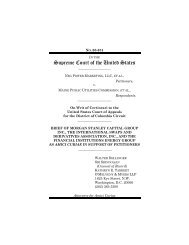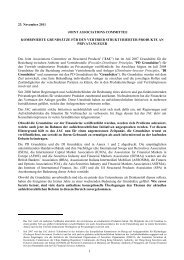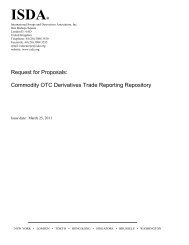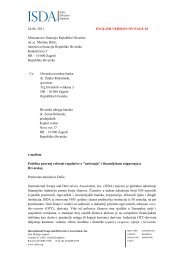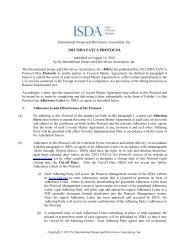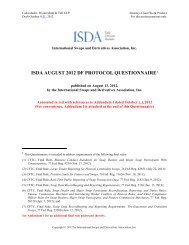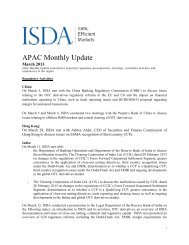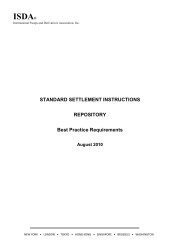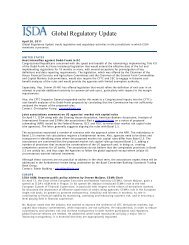Petition for a Writ of Certiorari - Snohomish. - ISDA
Petition for a Writ of Certiorari - Snohomish. - ISDA
Petition for a Writ of Certiorari - Snohomish. - ISDA
You also want an ePaper? Increase the reach of your titles
YUMPU automatically turns print PDFs into web optimized ePapers that Google loves.
9promoted the Act’s purposes, as well. “[P]reserving the integrity<strong>of</strong> contracts * * * permits the stability <strong>of</strong> supply arrangementswhich all agree is essential.” Id. at 344. Parties could not beexpected to make “substantial investments * * * without longtermcommitments,” and such commitments are impossible if“supply contracts are subject to unilateral change.” Ibid.The Court followed and extended the Mobile decision inanother unanimous decision on the same day. Federal PowerComm’n v. Sierra Pacific Power Co., 350 U.S. 348 (1956),arose under the Federal Power Act, the relevant provisions <strong>of</strong>which were “substantially identical” to the provisions <strong>of</strong> theNatural Gas Act that were construed in Mobile. Id. at 353.Sierra followed Mobile in holding that a party could not unilaterallymodify the rate established in a long-term contract by filingnew rates with the Commission. Sierra also addressed aquestion not presented in Mobile: In what circumstances couldthe Commission determine that contract rates were unlawful,and prescribe modifications to those rates to remedy the perceivedunlawfulness? Sierra held that the contractual rate couldbe set aside only if it would “adversely affect the public interest– as where it might impair the financial ability <strong>of</strong> the publicutility to continue its service, cast upon other consumers an excessiveburden, or be unduly discriminatory.” Id. at 355. This“public interest” standard is not satisfied merely because therate prescribed by the contract was a rate that the Commission,itself, could not have imposed under a “just and reasonable”standard. “[W]hile it may be that the Commission may not normallyimpose upon a public utility a rate which would produceless than a fair return, it does not follow that the public utilitymay not itself agree by contract to a rate af<strong>for</strong>ding less than afair return or that, if it does so, it is entitled to be relieved <strong>of</strong> itsimprovident bargain.” Ibid. “[A] contract may not be said to beeither ‘unjust’ or ‘unreasonable’ simply because it is unpr<strong>of</strong>itableto the public utility.” Ibid. In 2002, the Court explained,again, one <strong>of</strong> the reasons <strong>for</strong> that conclusion. “In wholesale markets,the party charging the rate and the party charged were<strong>of</strong>ten sophisticated businesses enjoying presumptively equal



